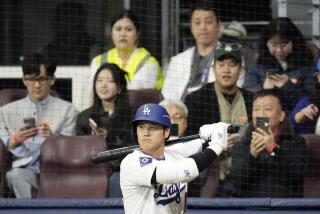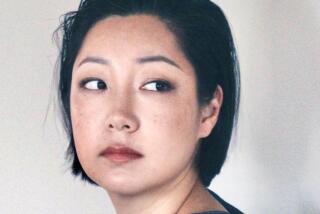Roh Starts Tokyo Visit Stirring Emotions on Both Sides : Japan: The South Korean leader is to discuss economic ties and other questions. But anger lingers over the brutal colonization of 1910-1945.
- Share via
TOKYO — South Korean President Roh Tae Woo arrived here today for a controversial state visit that is arousing intense emotions in both Japan and South Korea over the bitter historical legacy shared by the Asian neighbors.
Roh set the tone of his three-day visit on May 14 when he told Japanese reporters in Seoul that he hopes Emperor Akihito will make a clear-cut apology to South Koreans for Japan’s 1910-1945 colonization of the Korean Peninsula.
Irritated Japanese officials at first publicly rejected the demand, saying the constitution forbids the emperor from playing a “political role.” But on Wednesday, Prime Minister Toshiki Kaifu reportedly sent an envoy to Seoul to discuss the text of an apology statement being drafted for delivery by Akihito during an imperial banquet in Roh’s honor tonight.
Anger over Japanese colonial brutality runs deep in Korea, and demands for an unequivocal apology from Akihito have been raised in recent street demonstrations.
Protests culminated Wednesday with a 33-year-old videotape dealer, Kim Kuk Bin, stabbing himself in the abdomen before the Japanese Embassy in Seoul as he shouted: “Apologize, Akihito!”
Kim was rushed by police to a nearby hospital, where he told a news conference he was no longer able to endure Japan’s “lukewarm” attitude about the apology, the Associated Press reported from Seoul.
A series of minor acts of sabotage in Japan, meanwhile, have been blamed on right-wing and left-wing radicals opposing Roh’s visit, and security has been extremely tight in Tokyo since the beginning of the week; police have deployed 20,000 more officers.
Roh, the second South Korean president ever to visit Japan, originally planned to come in late 1988 but postponed the trip because of the illness of Emperor Hirohito, Akihito’s father.
Hirohito, known as Emperor Showa since his death in January, 1989, met former President Chun Doo Hwan in 1984 and made a vaguely worded expression of regret that many South Koreans now feel was insufficient.
“It is indeed regrettable that there was an unfortunate past between us for a period in this century,” Hirohito told Chun, “and I believe that it should not be repeated.”
The South Korean side has maintained that an imperial apology can be satisfactory only when it clarifies which country was the aggressor and which the victim, laying to rest forever suspicions that Japan has no remorse for its behavior. Only when the matter is clarified can the two countries build positive relations, said Lee Hong Koo, a special adviser to Roh.
“Collectively speaking, Koreans are not really sure of the depth of sincerity on the part of the Japanese,” Lee said during a recent visit to Tokyo. “Some Koreans feel that the Japanese think what went wrong was that they lost the war.”
Kyodo News Service, in a dispatch Wednesday, quoted a senior Japanese Foreign Ministry official as saying that Kaifu’s Cabinet is drafting a speech for Akihito that should “satisfy the expectations of the Korean people.”
Besides his audience and banquet with the emperor tonight, Roh is scheduled to hold two rounds of talks with Kaifu and to address the Japanese Parliament on Friday. The two leaders are expected to discuss economic ties and the sticky question of technology transfers, as well as humanitarian questions concerning Japan’s large Korean minority.
Nearly 700,000 Koreans are registered as permanent residents in Japan, many of them second-generation descendants of laborers brought here, sometimes forcibly, during the colonial period. Discrimination in education, employment and marriage is a serious problem for those who refuse to adopt Japanese names and fully assimilate.
One of the preconditions for Roh’s visit was an agreement on the legal status of so-called “third generation” Korean residents, offspring of Koreans who were born in Japan since 1971. At last count, there were four infants in this category, and they had no right to permanent residency because they were not covered in immigration protocols adopted when the two nations normalized relations in 1965.
Negotiators agreed April 30 that third-generation Koreans would not only have the right to residency, they would also be exempt from the alien fingerprinting requirements that critics say has come to symbolize discrimination against the Korean minority.
South Korea is still seeking compensation for Korean victims of the atomic bombings of Hiroshima and Nagasaki. These people have been denied the same government health benefits and pensions received by Japanese victims. Also, Japanese humanitarian assistance is being sought for Korean laborers left behind on Soviet Sakhalin, which was part of Tokyo’s empire until the end of the war.
Taizo Watanabe, spokesman for the Foreign Ministry, said Japan has been consistent over the years in having “very deep” feelings of apology toward Korea.
More to Read
Sign up for Essential California
The most important California stories and recommendations in your inbox every morning.
You may occasionally receive promotional content from the Los Angeles Times.













